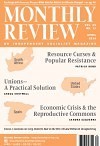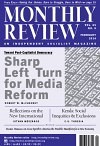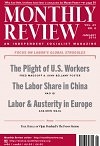Political Economy
The Struggle for Cooperative Ownership in Greensboro, North Carolina
There is much to ponder as the patchwork of American society continues to unravel from the effects of a new type of capitalist depression.… [T]he wealthiest 1% of Americans earned more than 19 percent of the country’s household income in 2012, their biggest share since 1928, a year before the Wall Street stock-market collapse.… [For an alternative to this] we might look to Occupy’s brief history beyond Wall Street—that is, in the cities and towns where its initial energy was so keenly felt, and where it is likely that many of us have since embarked on new projects that carry the potential of a transitional and transformational politics.… Such is the case in Greensboro, North Carolina, a mid-size Southern city known for its struggles for civil rights and socio-economic justice. It is here where the Occupy movement played a small but seminal role in what has become a fierce, grass-roots struggle for cooperative ownership in the African-American community. | more…

The insidious nature of the economy, state, and cultural apparatus of global monopoly-finance capital is difficult to perceive—if only because it is to be found everywhere we look. Focusing on a specific case can therefore help us see what might otherwise elude us. A striking instance of this principle is to be found in the recent takeover of Chrysler by Fiat—linking a century-old Italian auto dynasty, the Great Financial Crisis of 2007–2009, the U.S. corporate bailout, the 2014 Superbowl, and the American folk music tradition. | more…

This issue of Monthly Review is mainly devoted to two commemorations: for Paul Alexander Baran, who died fifty years ago this month; and for Hugo Rafael Chávez Friás, who died one year ago this month.… Paul A. Baran was the author of The Political Economy of Growth (1957) and, with Paul M. Sweezy, Monopoly Capital (1966). Baran’s work on the roots of underdevelopment focused on the way in which the imperialist world system robbed countries of their actual and potential economic surplus, chaining them to conditions of dependency.… Hugo Chávez, president of Venezuela from 1999 until his death in March 2013, provided the crucial inspiration for the Bolivarian Revolution in Venezuela. Chávez created a new vernacular of revolution linked historically to Latin America’s Bolivarian tradition (marked by Bolívar’s famous statement that “equality is the law of laws”). | more…
The correspondence of Paul Baran and Paul Sweezy in the 1950s and early ’60s is one of the great, unknown legacies of Marxian political economy in the United States. Over the past year and a half, I have been transcribing all of these letters with the goal of having the collection published by Monthly Review press, both as a hardcopy book of selected letters, as well as an unabridged e-book. In commemoration of my father, Paul A. Baran, on the fiftieth anniversary of his death on March 26, 1964, we decided to refer publicly for the first time to the Baran–Sweezy Letters Project and to publish a few important and representative letters. | more…

A comparison of the present state of the natural sciences with that of the social (or human) sciences cannot but give rise to a disquieting sense of the relative poverty of the latter. Although natural scientists are raising the alarm with regard to the planetary environmental emergency and are demanding social solutions, social scientists have largely failed to take up the challenge. To be sure, there has been a vast upsurge in recent years of social-scientific discussions of climate change. But most of this work has remained confined within the narrow boundaries of mainstream social science, relying on such amorphous, dehistoricized concepts as human behavior, organizations, institutions, government, economic growth, industrialization, modernization, the market, energy efficiency, public opinion, and the like—variables that can be treated in purely technical, “non-normative” terms, divorced from historical context, social relations, and social agency.… Conspicuously missing from conventional social science is any serious consideration of the actual social system in which we live and which clearly constitutes the root of the problem: namely, capitalism. Also excluded are such fundamental issues as accumulation, class (including its gendered and racialized forms), the state, the cultural apparatus, imperialism, monopolistic corporations, economic stagnation, financialization, Marx’s concept of the metabolic rift—and indeed all the other major historical realities of our time. | more…
Toward a Post-Capitalist Democracy
The contemporary media reform movement exploded into prominence in the United States in 2003 as a response to the effort by the Bush Federal Communications Commission (FCC) to weaken media ownership regulations.… The size and success of this popular uprising was…a testament to the power of activism to thwart the plans of the powerful in seemingly hopeless conditions.… The Obama campaign in 2007 and 2008 expressed interest in media reform and worked closely with members of the movement…. Except for Obama’s speech against the Iraq War invasion, it was arguably his communication platform that most distinguished him as a progressive in the 2008 presidential primaries.… One can debate whether this was an appropriate strategic shift at the time but there can be no debate that the strategy failed. The Obama administration abandoned its platform almost immediately, and repudiated the movement. | more…
Dare to Struggle, Dare to Win?
Any review of the recent ups and downs of U.S. labor must start in Michigan, long a bastion of blue-collar unionism rooted in car manufacturing. Fifteen months ago, this Midwestern industrial state became another notch in the belt of the National Right to Work Committee, joining the not-very-desirable company of Texas, Oklahoma, Alabama, and twenty other “open shop” states.… The emergence of sun-belt labor relations in the birthplace of the United Auto Workers (UAW) was shocking to some. But this political setback was preceded by high-profile defeats in neighboring states that began in 2005. First Indiana, followed by Wisconsin and Ohio, stripped public workers of their bargaining rights (although the Republican attack on government employees was later repelled by popular referendum in the Buckeye State). Then in early 2012, GOP legislators in Indiana passed a right-to-work law applicable to private industry. | more…
Social inequalities and exclusions can devastate people’s lives, especially when they are far from the centers of power and control. This wreckage can be seen in many different parts of their lives, but particularly in their health. The health of any given country’s population is primarily determined by politics, and public policies play a critical role. All over the world, countries with a history of egalitarian ideologies, and corresponding policies aimed at reducing social inequalities, have healthier populations. The Indian state of Kerala, which has a long-running radical political tradition and a history of social-reform movements in the early twentieth century, is acclaimed for its achievements in health and social-sector development, including low levels of mortality and fertility, and high levels of life expectancy and literacy—all despite its low-performing economy. Kerala has become a veritable mecca for other low-income nations in social development and health advancement. | more…

On November 16, 2013, Paul Krugman published a piece on his New York Times blog entitled “Secular Stagnation, Coalmines, Bubbles, and Larry Summers,” consisting of an extended commentary on former Clinton Treasury Secretary and Obama economic advisor Lawrence Summers’s November 8 presentation to the IMF’s Economic Forum.… Krugman, in following up on Summers’s IMF speech, highlighted Alvin Hansen’s theory of secular stagnation in the 1930s to ’50s.… [acknowledging that] long-term economic stagnation…was now “the norm” for the economy, not the exception.… Writing in a fashion that could have come straight out of Monthly Review at any point in the last forty years, he declared: “We now know that the economic expansion of 2003–2007 was driven by a bubble. You can say the same about the later part of the 90s expansion; and you can in fact say the same about the later years of the Reagan expansion, which was driven at that point by runaway thrift institutions and a large bubble in commercial real estate.” But in trying to understand how stagnation itself came about and created this whole irrational set of economic conditions, Krugman…failed to draw attention to the much more important problem of investment under conditions of overcapacity and mature industry, as well as the whole question of monopolistic/oligopolistic capitalism—all of which were taken seriously at some level by Hansen, and were developed in a far more radical way by socialist thinkers such as Michał Kalecki, Joseph Steindl, Paul Baran, and Paul Sweezy. | more…
Modern capitalism, sociologist Max Weber famously observed early in the twentieth century, is based on “the rational capitalistic organization of (formally) free labor.” But the “rationality” of the system in this sphere, as Weber was to acknowledge elsewhere, was so restrictive as to be in reality “irrational.” Despite its formal freedom, labor under capitalism was substantively unfree.… This was in accordance with the argument advanced in Karl Marx’s Capital. Since the vast majority of individuals in the capitalist system are divorced from the means of production they have no other way to survive but to sell their labor power to those who own these means, that is, the capitalist class.… The result is a strong tendency to the polarization of income and wealth in society. The more the social productivity of labor grows the more it serves to promote the wealth and power of private capital, while at the same time increasing the relative poverty and economic dependency of the workers. | more…
In the past two decades, China’s economic growth has been increasingly dependent on investment. To maintain the growth of investment, China must sustain a fairly high rate of profit, and the fall in labor’s share has been seen as a crucial factor to sustain profitability.… Although the mainstream economists have widely admitted there is a downward trend for labor’s share in China, they explain this trend with a story that has nothing to do with class struggle. In this story, the decline of labor’s share is caused by sectoral changes, mainly the decrease of agriculture and the increase of industry and services as a percent of GDP in the reform era…. [But] Does the decline of labor’s share result from sectoral changes?… [In fact] the decline of labor’s share resulted from the loss in the power of the working class during the transition to capitalism. Sectoral changes have disguised the class conflicts in this historical process. | more…
Political and Ideological Crisis in an Increasingly More Authoritarian European Union
Acute economic and political drama mark contemporary Europe. The terrible trauma of the financial crisis has been followed by a sovereign-debt disaster. In the countries most deeply affected, the people have been faced with massive attacks on public services, wages, pensions, trade unions, and social rights. The draconian austerity policies have pushed the situation in those countries from bad to worse, leading them into a deep depression.… Confronted with these multiple crises, the traditional labor movements appear perplexed and partly paralyzed. Social democracy is in political and ideological disarray and confusion, reflecting a deep crisis in these movements. On the one hand, social democrats have played a leading role in fierce attacks on trade unions and the welfare state in countries where they have been in power. On the other hand, other social democrats adopt statements and support appeals that sharply condemn the political course now followed by the European Union. | more…



